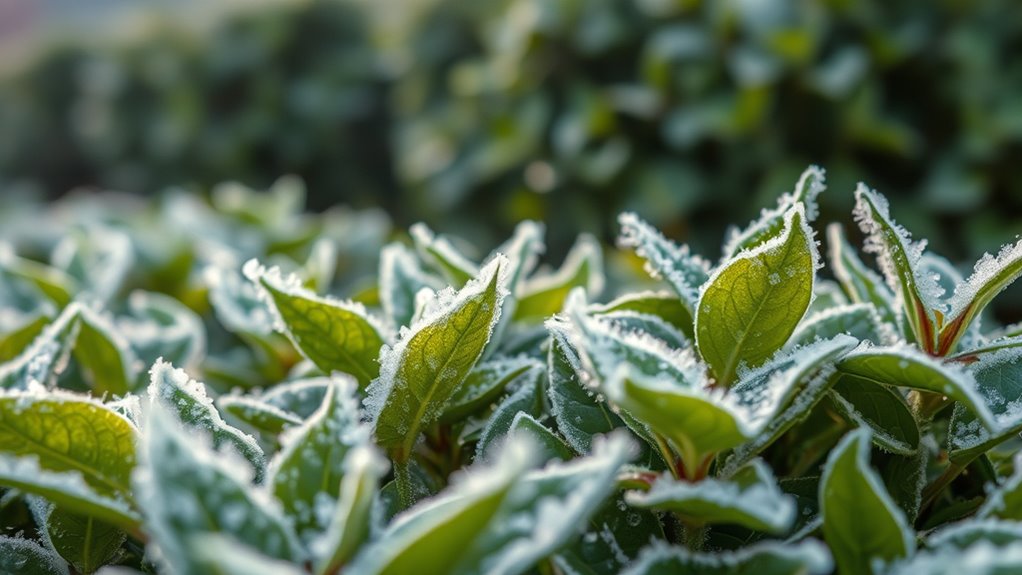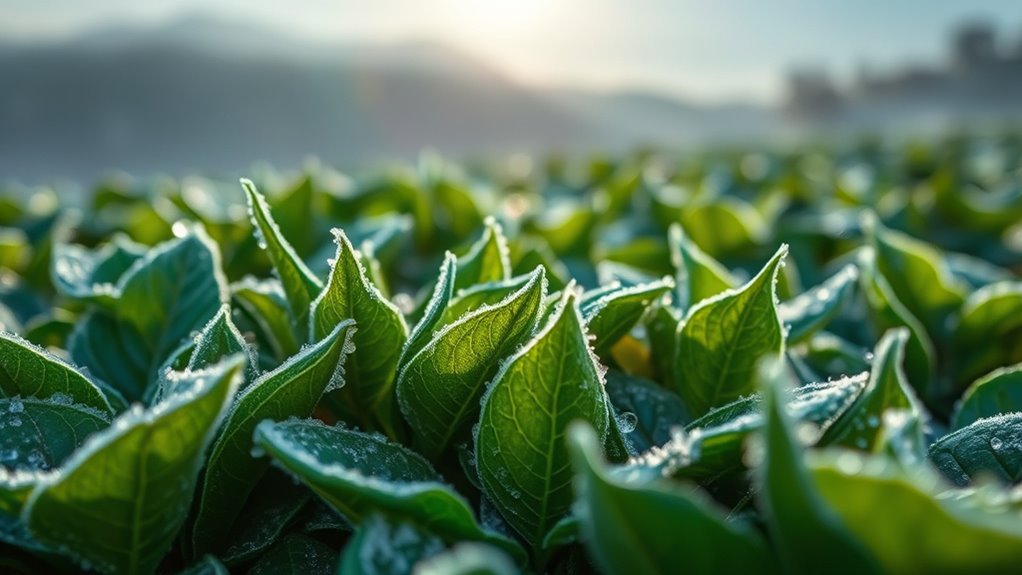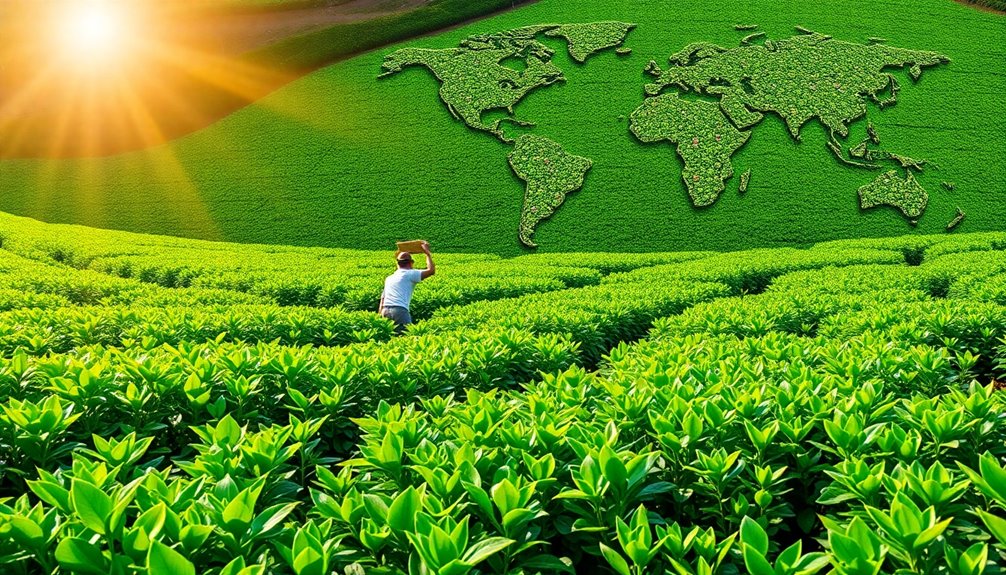Cold temperatures can cause your tea plants to adjust their alkaloid levels, often increasing compounds like caffeine and theobromine. These changes can lead to a more bitter, robust flavor and influence aroma and overall quality. The severity and duration of cold stress play key roles in how much these alkaloids fluctuate. If you’re curious how to manage this balance and improve tea quality during colder periods, there’s more to discover below.
Key Takeaways
- Cold temperatures induce cold stress that can increase alkaloid levels like caffeine and theobromine in tea plants.
- Prolonged cold exposure may cause a decline in overall metabolic activity, affecting alkaloid synthesis.
- Short-term cold spells often lead to rapid spikes in defensive alkaloids, altering tea flavor and aroma.
- Elevated caffeine during cold stress can result in a more bitter, robust taste profile.
- The severity and duration of cold influence the extent of alkaloid level changes in tea plants.

Cold temperatures markedly influence the alkaloid composition of tea plants, impacting both the quality and flavor of the final product. When temperatures drop unexpectedly or stay consistently low, your tea plants experience what’s known as cold stress. This stress triggers a range of physiological responses, including changes in alkaloid levels, which are crucial compounds affecting taste, aroma, and health benefits. As a grower or enthusiast, understanding how cold stress causes alkaloid variation helps you predict and manage the quality of your tea harvest.
Under cold stress, the plant’s metabolic pathways shift, often resulting in increased production of certain alkaloids like caffeine and theobromine. These compounds serve as natural defense mechanisms, helping the plant resist cold damage and pest attacks. During colder periods, you might notice the caffeine content in your tea leaves rising, which can lead to a more bitter or robust flavor profile. Conversely, some alkaloids may decrease if the plant’s metabolic activity slows down considerably, potentially dulling the aroma and reducing the overall complexity of the tea.
Cold stress can boost caffeine levels, intensifying tea’s bitterness and flavor complexity.
The variation in alkaloid levels caused by cold stress isn’t uniform; it depends on factors such as duration, severity, and timing of the cold spell. Short-term cold stress might cause a quick spike in certain alkaloids, while prolonged exposure could lead to a decline as the plant’s overall health diminishes. For example, if you experience a sudden cold snap during the early growing season, you may find that your tea leaves develop a different alkaloid profile compared to a season with milder temperatures. This variation can alter the final flavor, making it more astringent or introducing new aromatic nuances.
Managing cold stress involves strategies to mitigate its impact on alkaloid variation. Covering plants with protective fabrics, implementing proper site selection, or adjusting harvest times can help you control how much cold stress your plants endure. By doing so, you influence not only the plant’s health but also the alkaloid composition, ensuring your tea maintains its desired flavor profile. Recognizing how cold temperatures influence alkaloid levels allows you to fine-tune your cultivation practices, ultimately producing a more consistent and high-quality tea, even in challenging weather conditions. Additionally, understanding these biochemical responses can help you develop more resilient cultivation techniques aligned with plant stress responses and sustainable practices.
Frequently Asked Questions
Do Different Tea Varieties Respond Uniquely to Cold Stress?
You might wonder if different tea varieties react uniquely to cold stress. Genetic variability plays a key role, as some cultivars have traits for better cold tolerance. Varietal adaptation influences how plants respond, with certain varieties maintaining alkaloid levels better under cold conditions. By selecting and cultivating these resilient varieties, you can guarantee consistent quality and flavor, even when temperatures drop unexpectedly.
How Quickly Do Alkaloid Levels Change After Temperature Drops?
You might think alkaloid fluctuation takes weeks, but temperature sensitivity causes changes within days. When temperatures drop, your tea plants respond quickly, altering alkaloid levels to adapt. This rapid shift can influence flavor and potency, so it’s vital to monitor temperature drops closely. In just a short time, cold stress triggers these changes, making timing essential for peak tea quality and understanding how climate impacts your crop’s chemistry.
Can Cold Temperatures Influence Tea Plant Disease Resistance?
Cold temperatures can critically influence your tea plant’s disease resistance. When exposed to cold stress, your plants may become more susceptible to certain pathogens because their immune responses weaken. Cold stress hampers essential physiological functions, making it harder for your tea plants to fight off diseases. To protect your plants, guarantee proper cold management strategies, like mulching or covering, so they maintain resilience against disease susceptibility during cold spells.
Are There Specific Cold Thresholds That Impact Alkaloid Synthesis?
You wonder if there’s a specific cold threshold that impacts alkaloid synthesis in tea plants. Cold thresholds refer to temperature points where metabolic processes slow or halt. When temperatures drop below these thresholds, alkaloid synthesis, which depends on enzymatic activity, can decrease. This temperature sensitivity means maintaining ideal warmth is essential for consistent alkaloid levels, affecting tea quality and flavor.
Does Altitude Affect How Cold Impacts Tea Plant Alkaloid Levels?
Imagine climbing a mountain where the altitude effects create a chilly whisper in the air. You’ll find that temperature gradients at higher altitudes influence tea plants differently, often leading to lower alkaloid levels due to colder conditions. As you ascend, the colder climate acts like a silent artist, subtly shaping alkaloid synthesis. So, yes, altitude impacts how cold influences tea plants, with higher elevations feeling the chill more intensely.
Conclusion
Don’t assume cold temperatures automatically harm tea quality. While they can increase certain alkaloid levels, proper management and timing can guarantee your tea retains its desired flavor and potency. By understanding these effects, you can optimize harvest conditions and even enhance specific qualities. So, instead of fearing cold weather, use it to your advantage—adjust your practices accordingly, and you’ll produce better, more unique teas that stand out in the market.










